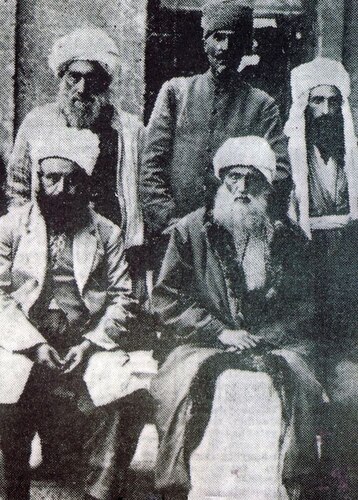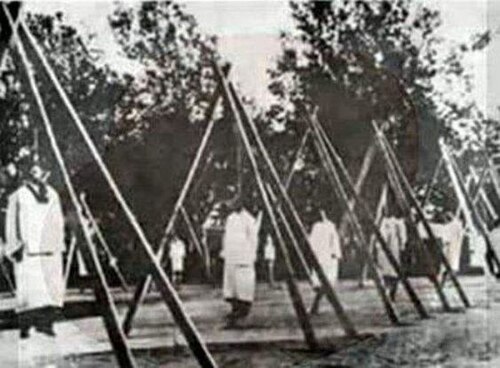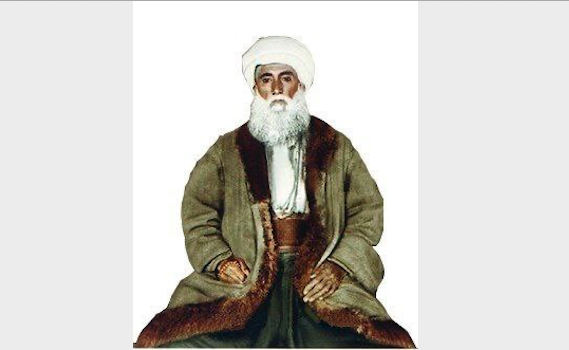Kurdshop - Sheikh Saied Piran has been a very famous person in the history of the Kurdish nation and Kurdistan and has always been a living name since the beginning of the 20th century.
Sheikh Saied led the largest national uprising in the northern part of Kurdistan. He rejected the occupying policy of denying Kurds.
The invaders of Kurdistan were afraid of him and his uprising and knew that his uprising would expand and build a great Kurdistan. The enemies knew that the Kurds would follow him and demand their right to self-determination through him. The enemies, therefore, suppressed the revolt with all their might and executed him inhumanly.
Sheikh Saied's family had a great social, religious, and national influence on Kurdistan. Sheikh Saeed was born in 1865 in Palu. His father's name was Sheikh Mahmud Fawzi Efendi and his mother's name was Marva Khan.
Sheikh Saied was a patriot and left a proud and historical legacy for the Kurdish nation. Sheikh Saed began his education in Mush and Malazgirt. After his father settled in Khins, he studied the Holy Qur'an and jurisprudence there. His father was the sheikh of the Naqshbandi court and at the same time the secretary of Sheikh Saied.

Sheikh Saied spent his childhood in Palu. During World War I, Russia occupied Kurdistan, so they moved and settled in Piran. Even after the World War, they went to Khins with their father and stayed there. He was religiously educated in Khins because his father owned religious schools in Palu, Khins, and Piran at that time, Sheikh Saied completed his education with many famous teachers.
After his father's death, Sheikh Saied was running the school services and the family had 400 religious' schools under his supervision. Sheikh Saied also had a very large library. It is known that he had about 20000 books in his library. Sheikh Saied knew Kurdistan's geography very well. In Kurdistan, he had strong relations with most of the sheikhs, tribal chiefs, emirs, and nobles of Kurdistan.
Sheikh Saied was known among the people as a scholar, sage, and philanthropist. People loved him as a religious, social, and business leader.
Sheikh Saied was a very compassionate person who respected the rights of other peoples, ethnic groups, and local minorities. When the Armenians were genocide by the occupiers, he stood up against the Armenian genocide and appealed against it, saying: "The Armenian genocide is neither conscientious nor religious but against humanity, Islam, and the rights of all nations."

How many languages did Sheikh Saied speak?
In addition to Kurdish, Sheikh Saied Efendi was fluent in Turkish, Armenian, Persian, and Arabic spoken and written. This linguistic knowledge gave Sheikh Saied Efendi the opportunity to communicate with many countries and scholars around the world. He had visited Arab countries, Iran, India, Uzbekistan, and many other Middle Eastern and Caucasian countries.
Beginning of Sheikh Saied's struggle
The Kurdistan National Uprising began in 1925 under the leadership of the Kurdistan Independence Committee. This was a Kurdish national movement led by the Kurdistan Independence Committee and Sheikh Saied Efendi.
After The Treaty of Lausanne, several Kurdish uprisings were organized in Iran, Turkey, and Iraq.
The Kemalists soon forgot all the promises they made to the Kurds in the “National Agreement” of January 1920, one of which was to respect the rights of minorities. The more Kemalists consolidated their position, the more they attacked the rights of citizens, especially the national rights of the Kurdish and Armenian peoples. In addition, the Turkish government had adopted a chauvinistic policy of dissolving and assimilating the Kurds.

The Freedom Organization was the first political party in Kurdistan. It was a very modern, social, national, and intellectual organization.
The 1925 movement was formed and conducted with the participation of the people. It was a very civilized movement. The leadership of the movement was led by religious and social figures and the leader of the movement was Sheikh Saied Piran. Therefore, the state did not want the 1925 national movement to be recognized as a national and organized movement. In 1921, the Turkish state began arresting citizens in Kurdistan. Kurdish politicians and intellectuals tried to establish a new organization in the same year. According to some historical sources, the "Freedom Organization" or "Kurdistan Independence Committee" was founded in 1921, according to other sources, in 1922, and according to others in 1923. Most historians agree on 1921.
The Kurdistan Independence Committee was different from the Kurdish organizations of the Ottoman period; It was an independent organization. The committee was led by Khalid Bag Jibri, son of Sheikh Saied Efendi, the head of the village, sheikhs, nobles, and famous Kurdish religious teachers. There were also famous soldiers in the Kurdistan Independence Committee. There were people like Mabusa Badlis and Yusef Zia Bag.
Some of the founders of the committee were: Dr. Fuad, Akram Jamil Pasha, Haji Musa, Husein Pasha, Ehsan Nuri Pasha, Sheikh Tahir, Saied Abdul Qadir, Haji Akhdi known as Tujo's father, Haji Musa Bag, Yusef Zia, Khalid Jibri, and Khalid Hasanan”.

The centre of the organization was Erzerum. However, the Freedom Organization soon expanded its activities secretly in many Kurdish cities and towns. The people gave it a lot of support and gathered around the leaders of the organization.
Khalid Bag and Yusef Zia Bag followed Sheikh Saied Efendi because he had a social and religious background; they found the place and went to him. They spoke with Sheikh Saied for several hours and made him a member of the Kurdistan Independence Committee and its chairman.
After Khalid Bag and Yusef Zia Bag were arrested in Badlis, the state and the Badlis High Court ordered the arrest of Sheikh Saied Efendi, but he did not go to court and left Khins and went to Piran. Before the 1925 uprising began, Sheikh Saied Efendi went to the people and spoke to them; some of his speeches were as follows: “The Turks deceived us. At first, the Turks said that the council and the government were common between us. They said that Kurds and Turks were brothers and equals, but now they deny us. They say there is no Kurd and we are all Turks. They have banned the Kurdish language and the name of the Kurdish country, which means Kurdistan. They occupied every part of Kurdistan. In order to rule Kurdistan, they built military bases in all parts of Kurdistan. We have no right to talk about the wealth of our country. Kurdish was the language of instruction in schools and we had education on history, culture, and literature. Schools are now banned and closed. Kurdish is also prohibited in schools. Kurdish children are educated in Turkish. There was a caliphate between us and the Turks, but now it is cancelled too. So, there are no values between us that bind us together. Now it is our duty to build our state, Kurdistan; this is a necessity. We must expel the Turks from our land. Let's own our land. Jihad is obligatory for this."

In 1925, the Kurdistan Revolution in Turkey began under the rule of Sheikh Saied Piran. The uprising soon became strong and widespread. The 1925 movement soon achieved great success and became a social movement. Many Kurdish cities were placed under their control. Sheikh Saied's forces soon captured Darahen, Maden, Siwerag, and Arkhan and headed for Amed. On the other hand, they captured Gmgm and moved to the city of Mush.
The government declared a state of emergency on February 21 and militarized Kurdish cities. However, Turkish army units retreated to Amed on February 23 in the face of a Kurdish uprising. Kurdish forces intensified the uprising and Alaziz was controlled by Kurdish forces.
On March 7 of the same year, Sheikh Saied's forces besieged Amed, but without taking the city, they were forced to retreat. On March 26, the Turkish army launched land and air attacks. Gradually, the Kurdish fighters weakened and the fighting went in favor of the Turkish army.
After months of fighting, many Kurdish cities were reoccupied again. In mid-April 1925, Sheikh Saied surrendered near Gmgm and one of the other leaders of the revolt, Sheikh Sharif, of Palu.
Unfortunately, the uprising was suppressed and Sheikh Saied, Dr. Fuad and other leaders were tried and later executed. On June 28, 1925, the chief prosecutor, who sentenced 53 of the uprising's leaders to death, told the court: “Some of you have committed bad acts against the government and used the caliphate as an excuse to defend your uprising be, but you all agreed on the establishment of an independent Kurdistan".

The 1925 uprising dealt a major blow to the Turkish government. It is also the largest document that Turkey needed 35000 soldiers and 12 aircraft to quell the uprising. The uprising was so significant that it threatened Turkey's existence as a state. Turkey was forced to deploy 80000 soldiers in Kurdistan. Turkish forces began to occupy Kurdistan, killing thousands of innocent civilians, many of them women and children. 206 villages were destroyed, 8758 houses were burned, and 15200 people were killed.
At that time, the brutality of the enemy reached such a level that the newspaper Waqt shamelessly wrote about the government: “Wherever there is a Turkish flag, there is no Kurd issue”.
When Sheikh Saied and his companions were taken to be executed, he said, "I have reached the end of my earthly life. I have no regrets that I sacrificed myself for my nation. But let our descendants take revenge and not put us to shame in front of our enemies.”
After the Kurdistan National Uprising in 1925, Sheikh Saied Piran and his fellow leaders and fighters were executed on June 29, 1925, in Amed. Most of them were Kurdish clerics and sheikhs whose only desire was to achieve the legitimate rights of the Kurdish people and Kurdistan's independence.








